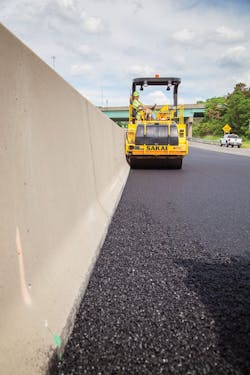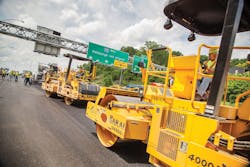Ready for the weekend
Six weekends in 2015: That is all the time Lindy Paving was given to repave Parkway West.
Parkway West, also signed I-376, is one of the main thoroughfares into and out of Pittsburgh, connecting the city to I-79 and Pittsburgh International Airport. A mix of two- and three-lane sections stretching 5.2 miles from I-79 to the Fort Pitt Tunnel, Parkway West carries an average of 84,700 cars and trucks each weekday, which is why closing the road during peak traffic times was out of the question for the Pennsylvania Department of Transportation (PennDOT).
“Pittsburgh is a busy town with Major League Baseball, football and hockey, plus all kinds of concerts and other high-volume events,” said Dan Ganoe, Lindy Paving’s vice president of operations. “Parkway West is one of the main arteries carrying traffic in and out of the city to the suburbs. Add the Monday-Friday rush hours, and you can understand why PennDOT decided that the majority of the resurfacing and renovation of Parkway West could only be done on weekends, starting at 10 p.m. Friday and wrapping up by 6 a.m. Monday.”
Compaction along a concrete divider on I-376.
Working within this schedule was challenging for Lindy Paving, which was subcontracted to handle the resurfacing by Swank Construction Co., the general contractor in charge of the entire Parkway West restoration project. In addition to resurfacing the lanes—which were last resurfaced with a 9.5-mm wearing course in 2004—the project included bridge rehabilitation, concrete barriers and sign structures. Parkway West’s drainage system and guardrails also were being upgraded.
“On average, Swank was removing/milling 12,000 tons of old roadway and Lindy Paving placed another 12,000 tons every weekend,” said Ganoe. “As a result there were large numbers of trucks constantly coming in and out of the work area. We had to develop well-thought-out access routes through the site each weekend with Swank to coordinate the movement of their equipment, trucks and activities, and ours.”
Strategy matters
Swank Construction and Lindy Paving divided the project area into six zones. Each weekend that they got to work—because some weekends are write-offs due to bad weather, major in-town public events, or both—they had to complete the work on one of the zones. No exceptions.
Their strategy? “Before we started, we made sure that all of our equipment was staged on-site, so that we could get right to work at our scheduled times,” said Ganoe. “We ran five to six paving crews each weekend, working 10 to 12 hours each, on a back-to-back basis.”
Because even the best-maintained paving equipment can fail, “we mobilized enough equipment to have a full paving spread as a backup,” said Greg Tomon, Lindy Paving’s field quality control manager. “Asphalt material was shipped from one of our two Greater Pittsburgh plants depending on the location of the project zone.” One of those plants was on Second Avenue in the city’s East End; the other was on Neville Island, northwest of the city.
For the repave, Lindy Paving planned to place three new courses atop Parkway West. First was a scratch course using a 9.5-mm PG 64-22 warm mix to level the surface. “This layer required a rubber-tire roller under PennDOT specifications,” said Tomon. “Field density was acceptance by the lift meeting the ‘roll to non-moment’ standard.”
Next was a 19-mm PG 76-22 warm-mix binder course with 15% reclaimed asphalt pavement (RAP), placed at a minimum of 2.5-in. lift thickness. “This course fell under Pennsylvania’s Restricted Performance Specification (RPS), which puts tighter tolerances on material and density parameters,” Tomon said.
Finally, the 1.5-in. wearing course—a 9.5-mm PG 76-22 stone-matrix asphalt (SMA)—went down. “We first used this mix design out of our Neville Island Plant in 2010 and have slightly modified it over the years to accommodate changing gradations and aggregate sources,” Ganoe said. The SMA included a 6.7% asphalt content, 4.7% mineral filler and 0.3% cellulose fiber. “The wearing course mix was 100% virgin asphalt,” said Tomon, “and it also fell under PennDOT’s RPS specification.”
Time is precious
Lindy Paving was focused on effective time management in order to make the Parkway West resurfacing project go as smoothly as possible. This is why the company was sourcing asphalt from plants on both sides of Pittsburgh and doing whatever it could to minimize delivery times.
“We planned primary and secondary routes for every operation for the fastest, most interference-free route to the jobsites,” said Ganoe. “We monitored these routes during the weekend, and altered them when traffic issues arose.”
Lindy Paving and Swank Construction ran back-to-back milling and paving crews on Parkway West. “Swank operated six to seven milling machines at a time on Friday nights to kick things off,” said Ganoe. “We followed early Saturday morning with multiple paving spreads consisting of Caterpillar AP1055D tracked pavers, Roadtec SB 2500 Shuttle Buggy material-transfer vehicles and Sakai 800 Series compactors.”
In a bid to save time, Lindy Paving placed and then compacted multiple lanes at a time. “To get compaction when paving 25 ft wide, we used four Sakai SW800 II rollers operating in vibratory mode and another Sakai unit to clean up the mat,” said Tomon. “The four vibrating rollers made anywhere from five to seven passes.”
Lindy Paving was fighting the clock in resurfacing Parkway West. But being short of time didn’t mean compromising on quality. In fact, to earn performance incentives and to avoid penalties, Lindy Paving worked closely with PennDOT to conduct material testing at its asphalt plants and on-site. The company’s crews also took core samples and conducted ride tests as work progressed to ensure compliance with the project standards.
“In the field, binder course samples were taken at a rate of five samples per every 2,500 tons,” Tomon said. Material samples taken behind the paver were tested by PennDOT technicians for asphalt content, gradation and theoretical density.
“Core samples had to score between 92% and 97% compacted density in order to receive full payment,” said Tomon. “The asphalt content for the binder had to be ±0.4% of the designed percentage for multiple samples.”
Joints also were particularly finicky, and density was tested through core samples. “Joints were tested between all mainline lanes and shoulder lanes, and bonuses and penalties were calculated with a percent within tolerance (PWT) formula,” Tomon said. Mindful that serious money rode on the quality of its joints, “we had a dedicated technician monitoring joints for compaction at all times,” Ganoe said.
Lindy Paving also kept a close eye on the smoothness and consistency of the ride of each asphalt course it laid down. “We continually tracked the ride of each lift placed, using a dual-sensor lightweight profiler,” said Tomon. “We knew the percentage of improvement we could achieve in order to produce a smooth finished product.”
Again money was on the line: The smoothest ride—35 in. per mile or smoother on the International Roughness Index (IRI) for a 528-ft section of highway—was worth a $600 bonus. The bonus was reduced to $300 for lots with an IRI of 36-49 in. per mile, and $150 for 50-59 in. per mile. An IRI measurement of 61–70 per lot received no bonus, and a ride bumpy enough to be measured as a 71 in. per mile or rougher per lot had to be corrected.
To keep on top of these quality indicators, Lindy Paving had at least five company technicians on-site to monitor material/joint samples and ride tests during the wearing-course paving. Though time was tight, quality determines how well the company gets paid.
Above: Massive coordination efforts have been required by Lindy Paving and Swank Construction due to the narrow worktime windows on the Parkway West project. Below: Workers lay down the binder course in advance of the final wearing-course lift.
Clock is ticking
As of early June, Lindy Paving had finished two of the six Parkway West project zones. In both cases, the company finished the resurfacing well in advance of the 6 a.m. Monday deadline.
“Getting the work done on time was extremely important,” said Ganoe. “For every hour we were late in reopening Parkway West on a Monday morning, damages could be assessed at a rate of $17,000 per hour.
“Yes, this was a high-pressure, time-sensitive job,” said Ganoe. “But thanks to extensive preplanning between our staff and Swank Construction, and the professionalism and skills of our workforce, we were able to keep PennDOT happy—and we intended to keep things that way until Parkway West is finished.” R&B



